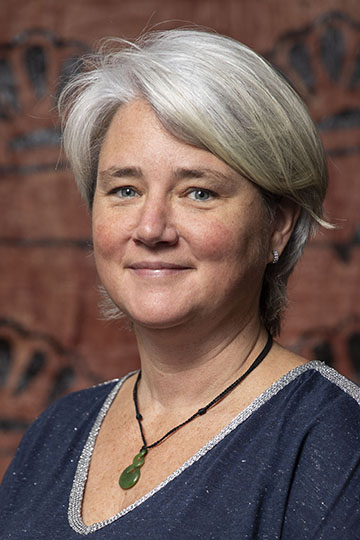
Frédérique Vanholsbeeck
In this installment of Senior Member Insights, OPN talks with Frédérique Vanholsbeeck—an associate professor at the University of Auckland, New Zealand, and the science leader of the Dodd Walls Centre for Photonic and Quantum Technologies.
Vanholsbeeck’s research focuses on real-time quantitative fluorescence spectroscopy, optical coherence tomography and nonlinear imaging, with applications ranging from counting bacteria to detecting early signs of diseases. She is also a strong advocate for a healthy work–life balance and diversity for both staff and students—as evidenced by her role as associate dean of diversity and inclusion for Auckland’s faculty of science, and by winning the 2018 OSA Diversity & Inclusion Advocacy award.
What first interested you in pursuing science?
I first enrolled in architecture, and then after two years, I switched to physics because I was interested in space and astronomy. However, I realized that on top of solving puzzles and understanding the world around us, I enjoyed working on practical problems such as modeling gas transport in the lungs to detect early signs of diseases. Understanding important problems and finding practical solutions is what got me into science.
If your 10-years-younger self was looking at your career now, what would she be most surprised by?
I am still there despite having had three kids, plus the diversity of my group and everything I have learned along the way.
What tips for successful networking do you have for early-career professionals?
Ask questions—most people are happy to talk about their work, and sometimes you will end up with a new collaborator. Being involved in your local chapter or scientific society is also a good way to network and give back to the science community. More importantly, make sure you have something to offer, as networking is not about asking but sharing.
What’s the best career decision you’ve ever made, and why?
To move to Aotearoa, New Zealand, as I got offered very early on to start my own research group. It was challenging, and the funding is scarce, but it was fun, and it is still a fantastic adventure.
What skills do you think are most important for someone interested in a career like yours?
The bottom line is obviously around science, and in our group, we do a lot of coding and image processing. Writing and management are not skills that are part of a standard physics or science curriculum; however, they are essential to run a group, get grants and get published.
Describe a major turning point in your career. Was there a specific action/accomplishment that got you there?
Getting my first major grant was the turning point of my career. I started with a tight budget thanks to a few seeds and early-career grants. Luckily, I had some really good students, and we managed to get some results—meaning that finally we got over the line for funding using our preliminary results.
What is one piece of advice that you wish you were given as a student/early in your career?
It can be very hard, and you need to be resilient, but more importantly, make sure to celebrate every success.
What have you learned by being a mentor to others, and what have you learned from mentors who helped shepherd your career?
I learned to listen and that, in most cases, there is a way forward. Talking it through with someone else is the best way, in my view, to sort it out. Often, people don’t see how good they are and how much they have achieved, so it is good to remind them and point out their successes.
At this point in your career, what are you most looking forward to next?
Our research center, the Dodd Walls Centre for Photonics and Quantum Technologies, has just been refunded for eight years, and I am looking forward to leading the science team for the next few years.
Outside of work, what is your favorite thing to do in your free time, and why?
Knitting and gardening, as they are a good way to free up your mind, plus you end up with something tangible. Obviously, I also enjoy having fun with friends and family.
